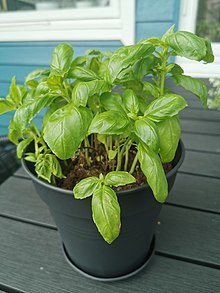
There is a simple and easy way to improve your skin microbiome and immune system, even if you live in the city - it's indoor gardening. A new study found that just 1 month of urban indoor gardening improves the skin microbiome (community of bacteria, viruses, fungi) and boosts the immune system.
What appeared to be critical for the skin and immune system health benefits was using a good quality soil, one with lots of microbes in it, such as a compost based soil. Avoid peat based soil, which is commonly available, because it is not rich microbially. The researchers found that growing plants in the peat based soil did not have any health benefits.
The study used flower or planter boxes filled with soil, and 7 kinds of plants (lettuce, white mustard, radish, garlic, ginger, pea, and fava bean) were planted into them. A grow lightbulb was used in a lamp because the study started in winter. Fertilizer sticks were used in the peat based soil group, while nutrients came from the compost in the rich soil group.
The participants in the study were instructed to monitor, water, harvest, and then consume the produce. That's it.
Bottom line: Set some plants on a sunny windowsill or buy grow lights for some indoor plants. Make sure the soil is a rich soil (compost based) and not peat-based. Enjoy!
From Science Daily: Urban gardening may improve human health: Microbial exposure boosts immune system
A one-month indoor gardening period increased the bacterial diversity of the skin and was associated with higher levels of anti-inflammatory molecules in the blood demonstrated a collaborative study between the University of Helsinki, Natural Resources Institute Finland and Tampere University.
In his doctoral thesis, Mika Saarenpää investigated, among other things, how microbial exposure that promotes the health of urban residents, particularly enhancing their immune regulation, could be increased easily through meaningful activities integrated into everyday life.
Previously, it has been shown that contact with nature-derived, microbially rich materials alters the human microbiota. In Saarenpää's study, research subjects committed to urban gardening, a natural activity for them, which may result in long-term changes in the functioning of the immune system.
"One month of urban indoor gardening boosted the diversity of bacteria on the skin of the subjects and was associated with higher levels of anti-inflammatory cytokines in the blood. The group studied used a growing medium with high microbial diversity emulating the forest soil," says Doctoral Researcher Mika Saarenpää from the Faculty of Biological and Environmental Sciences, University of Helsinki.
In contrast, the control group used a microbially poor peat-based medium. According to Saarenpää, no changes in the blood or the skin microbiota were seen. Peat is the most widely used growing medium in the world, and the environmental impact of its production is strongly negative. Moreover, Saarenpää's research indicates that it does not bring health benefits similar to a medium mimicking diverse forest soil.
"We know that urbanisation leads to reduction of microbial exposure, changes in the human microbiota and an increase in the risk of immune-mediated diseases. This is the first time we can demonstrate that meaningful and natural human activity can increase the diversity of the microbiota of healthy adults and, at the same time, contribute to the regulation of the immune system.
Urban gardening is an effortless way to improve health
Microbial exposure can be increased easily and safely at home throughout the year. The space and financial investment required is minor: in the study, the gardening took place in regular flower boxes, while the plants cultivated, such as peas, beans, mustards and salads, came from the shop shelf. Changes were observed already in a month, but as the research subjects enjoyed the gardening, many of them announced that they would continue the activity and switch to outdoor gardening in the summer.
According to Saarenpää, microbe-mediated immunoregulation can, at its best, reduce the risk of immune-mediated diseases or even their symptoms. If health-promoting microbial exposure could be increased at the population level, the healthcare costs associated with these diseases could be reduced and people's quality of life improved.
Saarenpää considers it important to invest in children's exposure to nature and microbes, as the development of the immune system is at its most active in childhood. Planter boxes filled with microbially rich soil could be introduced at kindergartens, schools and, for example, hospitals, especially in densely built urban areas. For urban gardening to bring health benefits instead of risks, the skin of the hands in particular must be unbroken, and the inhalation of dusty growing media avoided.
